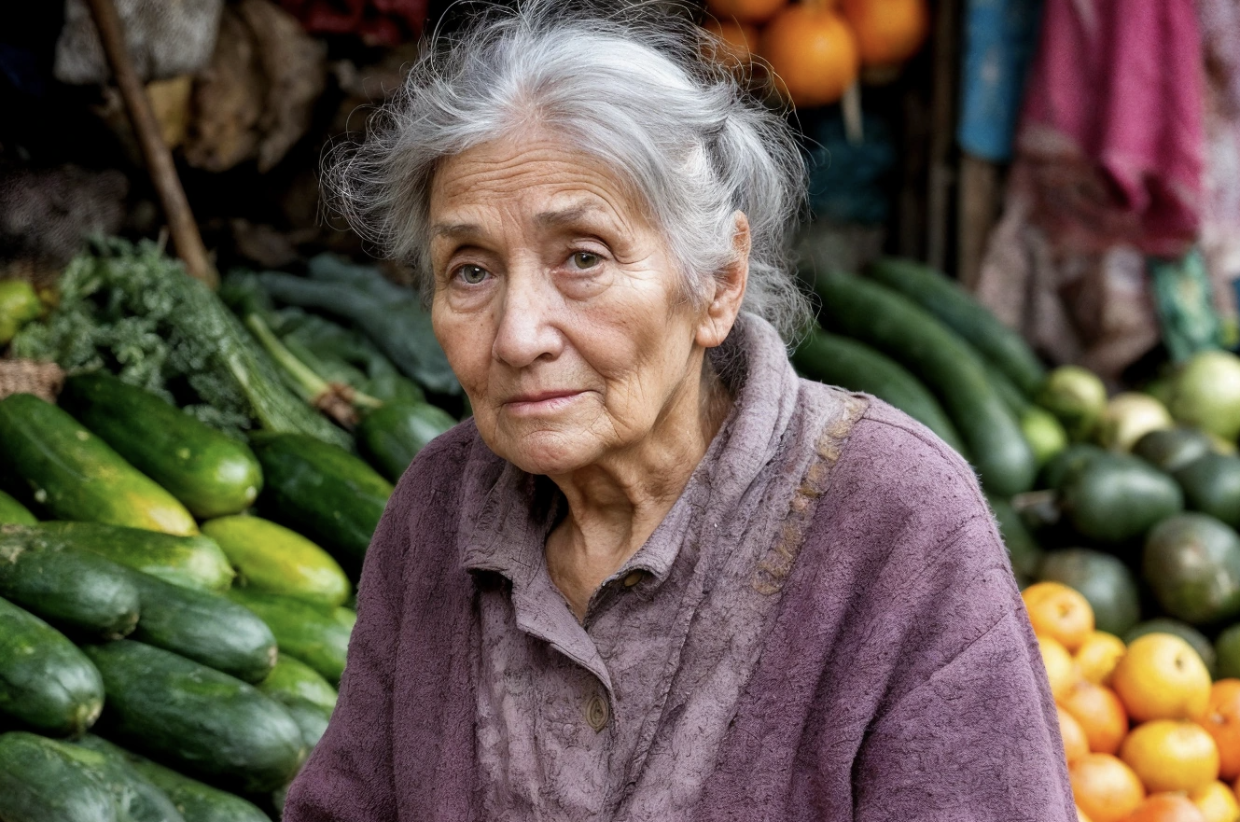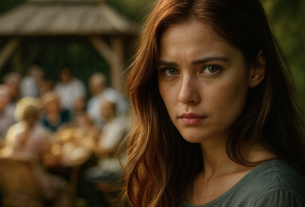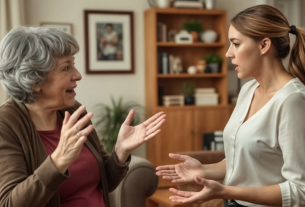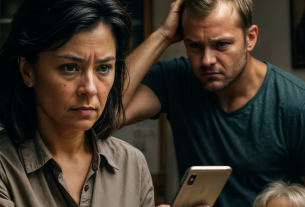The market buzzed like a huge beehive. On this warm July day, the townspeople filled the narrow aisles between the stalls, piled high with vegetables, fruits, greens, and other summer bounty. Some bargained loudly, some laughed joyfully, hugging bags full of juicy peaches and fragrant tomatoes.
Andrei, a tall man in his thirties with a short beard and a look of weariness in his eyes, walked into the market out of habit. He didn’t like supermarkets—everything there felt artificial. But here, it was real: cucumbers with fresh bumps, tomatoes that smelled like the sun, and conversations—loud, lively, familiar.
He slowly walked between the rows, picking out ripe peaches, when he noticed an old woman at one of the vegetable stands. She looked tiny among the colorful rows: a dark dress, a worn bag slung over her shoulder, a neat gray bun. She stood still, leaning over a box of zucchini. She wasn’t picking anything. She was just looking.
Andrei was about to walk past, but he stopped. There was something magnetic in her gaze. He turned around—she gently touched a tomato, then put it back and sighed deeply.
“Grandma, are you looking for something?” he asked, approaching her.
The old woman flinched and turned. Her face was creased with wrinkles, but there was a calmness in her eyes.
“No, grandson,” she answered softly. “I’m just looking. My pension is small, so I come here… like to a garden. Everything smells like it used to.”
She smiled—a little shyly, almost apologetically.
Andrei hesitated, then glanced at her empty bag.
“And what foods do you like the most?” he asked after a pause.
“Tomatoes,” she replied. “They should be sweet like honey. And cucumbers. The kind with bumps, like when I was a child.”
Without saying anything more, Andrei walked up to the vendor:
“Give me a kilo of tomatoes, cucumbers, zucchinis, and… about three kilos of potatoes. Carrots, onions. And some dill and parsley.”
The old woman tried to say something, but he stopped her with a gesture.
“This is for you. Just because it shouldn’t be like this.”
“But I didn’t ask for it…”
“I know.”
He carefully packed the groceries into bags and handed them to her. She took them hesitantly, as if afraid they might disappear. Tears slid down her cheeks.
“Thank you, dear. You’re kind. There are so few like you nowadays.”
Andrei smiled faintly.
“Maybe not few. Just many are too shy to be kind.”
He left her with the vegetables, which had become a real celebration for her. But the thought of her didn’t leave his mind all evening. “I’m just looking,” echoed in his head like a voice of conscience.
The next day, he returned to the market. He searched with his eyes—and found her. The same old woman. Now she was standing at a different stall, examining apricots.
“Hello,” he said, approaching.
She turned, immediately recognizing him. She smiled—a real smile.
“You again?” she said in surprise. “I made soup yesterday. Just like in my youth.”
“And what are we making today?”
“And today… I’m just looking,” she said, but without the same certainty as before.
Andrei bought her apricots and apples. She didn’t refuse.
A week later, they had established a ritual: Tuesdays and Saturdays were market days. She looked at the vegetables and fruits, he bought them, and then they sat on a bench by the fountain, drinking tea and talking. Nina Andreyevna told stories—about the war, about the first television, about how she used to grow cucumbers in her garden.
“My name is Nina Andreyevna,” she confessed one day.
“Andrei,” he replied. “Almost the same name.”
She looked at him carefully.
“You’re not like those who just help. You seem like you’re looking for something.”
Andrei thought for a moment.
“Maybe. I don’t even know what. But sometimes it feels like something’s wrong in this life. Something not quite human.”
“I’ve seen a lot,” she said. “I’ve met kind people, greedy ones, and indifferent ones. The most important thing is not the quantity of kindness, but that it comes from the heart. And you—yours is from the heart. Because you didn’t just give—you stayed beside me.”
From that day on, he came without buying anything. He brought tea, pie, bread. They walked in the park, he read books to her aloud, and she knitted him socks.
“Your hands are always cold, grandson,” she said, hiding a smile.
One day, she said:
“I have a grandson. But he lives far away. He rarely calls. And you… you’re like his light. Closer. Warmer.”
He stayed silent. He just squeezed her hand.
Two months passed. Summer was coming to an end. Andrei realized he couldn’t imagine his life without these meetings.
But one day, Nina Andreyevna didn’t show up. Neither on Tuesday nor on Saturday.
He started looking. He asked the vendor from whom they usually bought vegetables.
“Nina Andreyevna? They took her to the hospital. Heart, they say. Her neighbor told me.”
Andrei found the address. He came. He found the room. She lay pale and thin, like a shadow. But when she saw him, her eyes lit up.
“I knew you’d come.”
He sat down next to her, took her hand. He was silent.
“Don’t be sad, grandson. Everything happens as it should. The most important thing is that we found each other. Even if only for a short time. That was true happiness.”
He came every day. He read her books, showed her pictures from the market: “Here are your zucchinis. And here—peaches, just the way you like them.”
A week later, she was gone.
He cried. Really cried.
A month later, Andrei returned to the market. To the same stall. He held a wooden plaque in his hands. He carefully placed it next to the box of tomatoes.
It read:
“Admiring is not forbidden. In memory of Nina Andreyevna. The woman who loved to look at vegetables like they were a miracle.”
The vendor read it, sighed:
“She was a good one. Very warm.”
Andrei kept coming on Tuesdays and Saturdays. Sometimes he just sat on the bench. Sometimes he bought groceries for the elderly. One time, he paid for someone else’s purchase. Another time, he helped carry a bag to the tram.
People noticed. Some followed his example. A new plaque appeared on the stall:
“If you can’t buy, just say so. We are here.”
Thus, from one woman who simply loved to look at tomatoes, a small but warm movement began. Not loud, but important.
Andrei understood: he had found what he was looking for.
Not great. Not noisy.
Just humanity.
And let them call it charity, kindness, or simple politeness—he knew: it all came from one simple glance.
From the words:
“Grandson, I’m just looking. My pension is small.”
And from that day on, he no longer passed by a single such glance.
Because now he knew: in each of them was an entire world that wanted to be heard.



